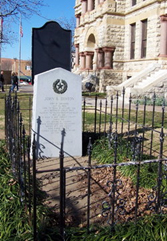
Grave of John Bunyan Denton(1806-1841) located on the south side of the old Denton County Courthouse lawn in Denton, Texas.
John B. Denton, Methodist preacher, lawyer, and Indian fighter, traveled miles in his thirty-five years. Yet, he also traveled miles in death. Buried in two different locations before arriving at his final resting place in 1901, he now lies in the serene lawn of the Denton County Courthouse in Denton, Texas.
Denton, the man, was born in Tennessee in 1806 to an itinerant Methodist preacher and his wife. He was orphaned by the time he was eight years old. Adopted by a family named Wells who migrated to Arkansas Territory, he was apprenticed to a blacksmith. At age twelve, he ran away and worked for a time on an Arkansas River flatboat. Eight years later he married Mary Greenlee Stewart in Louisiana. The couple were parents of six children. It was Mary who taught John to read and write well enough to become a minister and attorney.
Shortly after his marriage John joined the Methodist Episcopal Church South and served as a travelling preacher for ten years in southern Missouri and Arkansas. Sometime in late 1836 or early 1837, he crossed the Red River into Texas with his friend the Methodist missionary Littleton Fowler. The two left from Hempstead County, Arkansas headed to Clarksville where Fowler had relatives. After traveling with Fowler into Nacogdoches, Denton returned to north Texas where he was named pastor on the Sulphur Fork Circuit. It was there that Denton sent for his wife and children to join him.
On March 1838 Denton wrote his friend Fowler that the congregation in Clarksville pledged four to five thousand dollars for a new church building. Martha Stroud in her book Gateway to Texas: History of Red River County believed that the church in Clarksville was established when Denton arrived.
During this time period gospel preaching was an irregular event when every “wayfaring” preacher was invited, or even begged, to hold services where even a few families could congregate. Denton was described as vigorous and colorful. One fellow minister compared him to a “diamond in the rough.” He described himself as impetuous.
In 1837 Denton was scheduled to preach at a camp meeting at Shelton’s Camp Ground when the meeting was suddenly cancelled due to recent Indian Depredations. But Denton settled into life on the north Texas frontier. He obtained a 2nd Class Land Certificate for 640 acres in Red River County on October 4, 1838. He ran an unsuccessful campaign for the Republic of Texas Congress. Yet by the close of 1838, Denton formed a law practice with John B. Craig, also a Methodist preacher, in Clarksville. Since he was the junior partner, Denton rode the Court Circuit and frequently preached wherever District Court was held.
Like most men on the northern frontier of the Republic of Texas, Denton served as captain in a company of rangers. Sometime in late 1840 or early 1841 in what is now Denton County he preached at least one sermon to the Rangers on Long Prairie.
All lands east of the Cross Timbers in north Texas were devoid of native inhabitants by the days of the Republic of Texas. Remnants of tribes from the United States, known as immigrant tribes, looked for places to live in peace; however, it took very little to incite both whites and Indians into deadly skirmishes. On May 22, 1841 such a skirmish occurred at the battle of Village Creek six miles east of the site of Fort Worth. Led by General Edward H. Tarrant, the rangers attacked the village with no loss of their men. At that point Tarrant directed Captain Denton to take a scouting party of twenty men to locate the remnants of the tribe. As he led the party up a slight hill, John B. Denton was shot in the chest and fatally wounded. His troops tied his body to a horse and returned to the rest of the party. They buried him on the prairie past Bird’s Station on the east bank of Oliver Creek at its confluence of what would soon become known as Denton Creek.
In 1861 Denton County rancher John S. Chisum exhumed Denton’s body and moved it to his ranch near Bolivar. Chisum abandoned his ranch for land in what became Lincoln County, New Mexico. When he left Denton County during the Civil War he left the gravesite unmarked. In 1901 the Pioneer Association of Denton County decided to move the remains from the old Chisum Ranch to the courthouse square in the town of Denton. After diligent search and thorough identification, the remains were buried with appropriate ceremonies. Ironically, the rites were performed by Reverend William Allen, a Methodist minister who as a teenager rode with Captain Denton and the pursuant chase when Denton was killed.
